While the circumstances of the apparently involuntary fortnight-long stay of Lebanese Prime Minister Saad Hariri in Saudi Arabia in November remain unclear, what is certain is that he and his family’s business dealings are under the scrutiny of the Saudi regime, which last month launched a spectacular” anti-corruption” crackdown led by the son of King Salman bin Abdulaziz, Crown Prince Mohammed bin Salman.
Immediately after arriving in the Saudi capital Riyadh early last month, Hariri announced his surprise resignation as prime minister of Lebanon, citing fears he was the target of an assassination plot and denouncing, in uncharacteristic language, Iran’s role in causing unrest in the Middle East, sending shockwaves throughout the region which threatened to plunge Beirut into renewed political chaos.
To all appearances, and notably in the view of Lebanese President Michel Aoun, Hariri had been forced by the Saudi regime into making the dramatic announcement, and was kept in Ryadh against his will. On his return to Lebanon via France on November 22nd, after intense diplomatic moves by Paris, Hariri withdrew his resignation, ending almost three weeks of crisis. But what exactly lay behind Hariri’s dash to Saudi Arabia and his resignation and outburst against Iran, seemingly imposed upon him despite his denials, remains the subject of speculation.
Beginning when Hariri arrived in Riyadh last month, 32-year-old Saudi Crown Prince Mohammed bin Salman has led a purge of high-placed figures of the former ruling regime in what many analysts regard as the final stage of his bid to gain absolute control of the country, where the Hariri family-run construction firm Saudi Oger has played a leading role over many years in building projects and various other business interests.
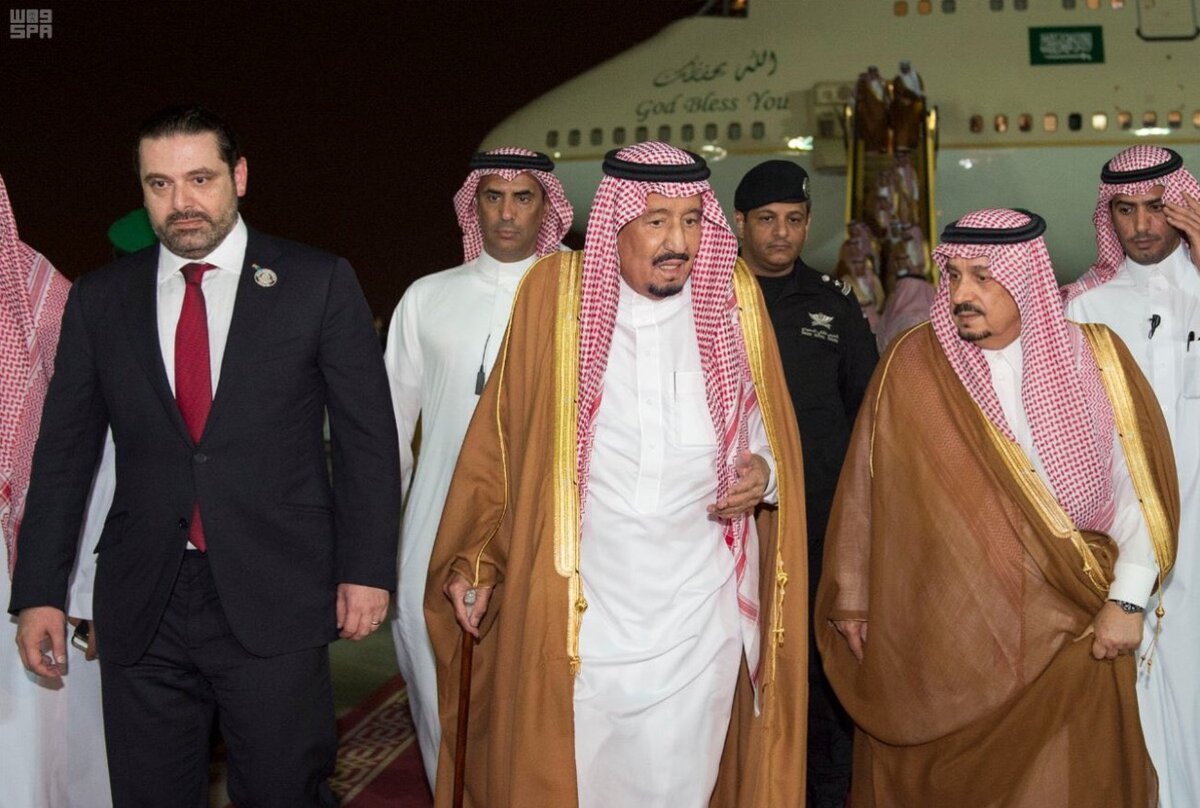
Enlargement : Illustration 1

The arrests of former ministers, members of the royal family and businessmen accused of financial corruption, notably under the 2005-2015 reign of King Salman’s predecessor, Abdullah bin Abdulaziz Al Saud, has been followed by the freezing of assets which some reports estimate could total 800 billion dollars.
Saad Hariri, 47, who was born in Ryadh and who has has joint Lebanese, Saudi and French nationality, first served as Lebanese prime minister from 2009 to 2011, and began his current second term as prime minister in December 2016. His father Rafik Hariri, who was also twice prime minister of Lebanon, from 1992 to 1998 and again from 2000 to 2004, built up a vast business empire in Saudi Arabia in a rags-to-riches career which began when he left Lebanon for the Saudi kingdom in the 1960s. His entrepreneurial success led to the creation in 1978 of Saudi Oger, essentially a construction firm but with a number of offshoots, including a telecommunications branch, all entirely owned by the Hariri family.
Saad Hariri worked in the family business in Saudi Arabia before taking up an active political role in Lebanon after his father Rafik was killed in a suicide bomb attack in Beirut in February 2005.
It was from about 2013 that Riyadh-based Saudi Oger began running into financial difficulties. From 2015, over two years, 56,000 employees of 40 different nationalities were dumped by the struggling group, abandoned and unpaid, until the business was finally wound down on July 31st this year.
Previously, Saudi Oger was involved in some of the most prestigious construction projects in the Saudi kingdom, the most recent being the completion, in 2011, of the campus of the Princess Noura Bint Abdulrahman University in Riyadh in a contract valued at more than 3 billion euros. But following the death of Saudi King Abdullah bin Abdulaziz Al Saud, and the arrival on the throne of Salman bin Abdulaziz Al Saud, the sometimes excessive payments the firm received from the Saudi administration dried up.
It was just as the purge presented as an anti-corruption drive was launched last month by Crown Prince Mohammed bin Salman that Saad Hariri flew into Saudi Arabia, late on Friday November 3rd. The following day the arrests of more than 200 people, notably 11 of the country’s princes, including former ministers and senior public officials and businessmen were announced. That same day, November 4th, Hariri, a Sunni Muslim, made his shock televised address from Riyadh announcing his resignation as head of Lebanon’s government of national union, which includes members of the Shiite militia and political group Hezbollah, saying that he feared an assassination attempt, and launched into a scathing attack on Iran and its ally Hezbollah for sowing strife in the Middle East.
Over the following two weeks Hariri remained shut away in Riyadh in what Lebanese President Michel Aoun called “obscure circumstances”. Aoun suggested Hariri was being held against his will by the Saudis, saying he was subject to a “degree of restriction of his freedom [...] his residence and the contacts he might have had, even with members of his family”. Hariri was eventually able to leave Saudi Arabia for France overnight on November 17th, after intense diplomatic activity by Paris, returning to Lebanon five days later when he reversed his decision to resign.
While it was widely speculated that Hariri’s resignation and mysterious stay in Riyadh was part of Saudi manoeuvring against its arch rival Iran, in the background lies a more personal financial dispute between Hariri and the Saudi monarchy that centres on Saudi Oger’s debts, estimated at between 3-4 billion dollars, including about 600 million dollars in unpaid wages to staff. “The Saudi government must settle its arrears, once it will have done so we will pay the salaries,” Hariri said earlier this month in an interview with French weekly Paris-Match.
It remains unclear why the Saudi monarchy has blocked the payments claimed by Hariri, who was questioned by the Saudi National Anti-Corruption Commission as a Saudi citizen and not in his capacity as Lebanese prime minister. Responsibility for bankruptcy is considered to be a crime in Saudi Arabia, and one which carries a potential prison term.
Among former Saudi Oger employees who are owed wages are 240 French nationals, who found themselves blocked in Saudi Arabia in 2015 and 2016, unable to leave the country because of the debts they had incurred after the firm crashed. They were finally allowed to return to France after diplomatic negotiations between Paris and Riyadh. Some of them had been recruited by Oger International, a French-based arm of Saudi Oger, and brought a collective case before a French industrial tribunal seeking the payment of an estimated 15 million euros in unpaid salaries. Meanwhile, it was revealed in September that about 700 former Lebanese employees of Hariri’s firm were still blocked in Saudi Arabia, also unable to leave because of their debts.
Earlier this month the Swiss authorities announced the Saudi authorities had passed on to them bank details collected as part of the anti-corruption purge. A number of Swiss banks are readying themselves for a Saudi request for the freezing of the accounts of those implicated in the anti-corruption crackdown, notably after Crown Prince Salman bin Abdulaziz announced his intention of recovering a claimed hundreds of billions of dollars in assets that were transferred outside the country. It is speculated that both Hariri and his former rival, the Saudi Binladen Group, may be threatened by such a move unless a deal is reached with the Saudi ruler. In June this year, one month before Saudi Oger was officially wound down, Saad Hariri’s brother Ayman Hariri, who headed the Saudi operations of the firm, sold all of his 42.24% stake in the Hariri family’s bank, BankMed, for a total of 535.2 million dollars.
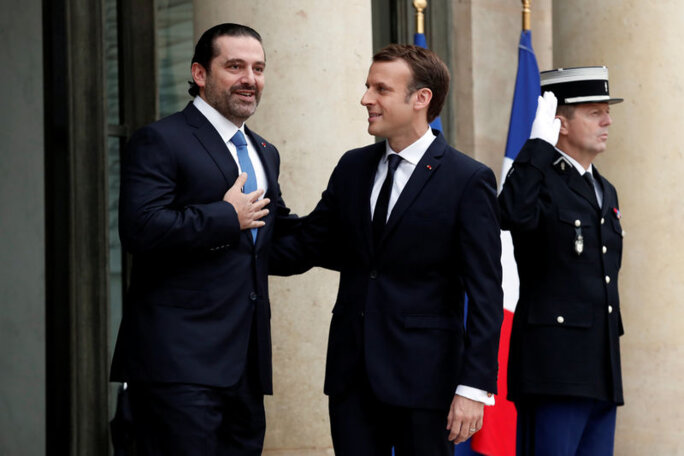
Enlargement : Illustration 2

Saad Hariri’s arrival in France on November 18th followed intense diplomacy by Paris, beginning with a visit to Riyadh on November 9th by French President Emmanuel Macron when he met with Crown Prince Mohammed bin Salman. In his interview with Paris-Match earlier this month, Hariri said that “one day” Macron’s “historic role” would be made known. Hariri was also able to count on the active behind-the-scenes support of key figures from the entourage of former French president Jacques Chirac, who has long had close relations with the Hariri family. These include Bernard Émié, a senior diplomatic advisor to Chirac when he was president and subsequently France’s ambassador to Lebanon, who Macron appointed in June as head of the French external intelligence agency, the DGSE, and Maurice Gourdault-Montagne, another senior diplomatic advisor to Chirac during his second term in office between 2002 and 2007 who in July was made secretary general of the French foreign affairs ministry. Both men are well known to Hariri and one of his key business associates in France, French lawyer Basile Yared.
'The French state is owed payments by the Hariri group'
In his interview this month with Paris-Match, Hariri said that he had “called Claude” on his arrival in France from Saudi Arabia last month, referring to Chirac’s daughter who has long played an influential role in the political career of her father, now a recluse suffering declining poor health since leaving office. Hariri added that during his stay in Saudi Arabia in November, his widowed mother-in-law Nazek Hariri, who also owns a stake in the Oger Group Limited holding company, “had been able to speak” to Jacques Chirac.
The former French president’s close ties with the late Rafik Hariri, his sons and second wife were such that after leaving office in 2007, Chirac moved in to a luxury apartment which was the property of the Hariri family’s business empire, occupying almost 400 square metres and situated on the Quai Voltaire in central Paris, overlooking the River Seine and the Louvre museum.
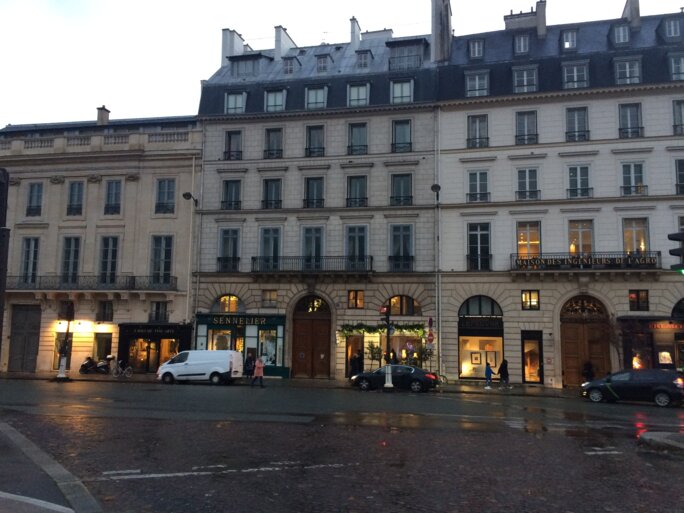
Enlargement : Illustration 3

At the time, a statement was released to the press by Chirac’s private office stating: “Given the duties that are theirs, Mr and Mrs Chirac have not yet had the time to find their lodgings. They will occupy, on a very provisional basis, an apartment on the Quai Voltaire which is lent to them by Mr Ayman Hariri, the time for them to find their definitive home.” In the event, the couple remained in the apartment owned by Fradim, one of the Hariri group’s businesses, until 2015, moving on to premises which were more easily accessible for Chirac whose declining health has left him largely wheelchair bound.
Paris remains an important base for the under-threat Hariri business empire. Oger International, its construction industry engineering studies centre based in the Paris suburb of Saint-Ouen, has been voluntarily placed under a “safeguard” procedure by a commercial court (a step aimed at reorganizing and sustaining a company in financial difficulty), and this year laid off more than 100 of its staff. Its management hope to be granted permission to continue operations despite the virtual closure of its activities in Saudi Arabia, a market that represented 70% of its turnover, which amounted to 103 million euros in 2015.
But it faces further financial woes through the action brought by former French employees of Saudi Oger before an industrial tribunal to recover their unpaid wages. “But Oger International was not their employer, contrary to what they claim,” said Oger International’s lawyer Laurent Cotret. “Saudi Oger was our co-contractor, and also owes us 47 million [euros]. Oger is not one, unique entity. The Hariri family [business] is made up of several branches. There is not a unique holder of the same group.”
In fact, Saad Hariri, who heads the Dubai-registered holding company Oger Group Holding Limited, his brother Ayman who heads Saudi Oger, and French lawyer Basile Yared, were members of the board of Oger International up until 2015, standing down after the financial difficulties of the businesses began.
Caroline Wassermann and Jean-Luc Tissot, the lawyers representing the unpaid French former employees of Saudi Oger, tried in vain to enlist the support of President Macron’s diplomatic advisor Aurélien Lechevallier to help with their cause. “The French state is however directly concerned by other outstanding payments of the Hariri group,” said Wassermann. “The group owes 1.1 million [euros] to the Caisse des Français de l’étranger [French social security fund for expatriates] and 920,000 euros to Axa France for health insurance, 720,000 euros to [French employment agency] Pôle Emploi, 2.1 million [euros] to [French construction industry insurance company] Pro BTP for pension contributions. To this day, not one French politician has made a move to denounce the facts. I’d like someone to tell me why.”
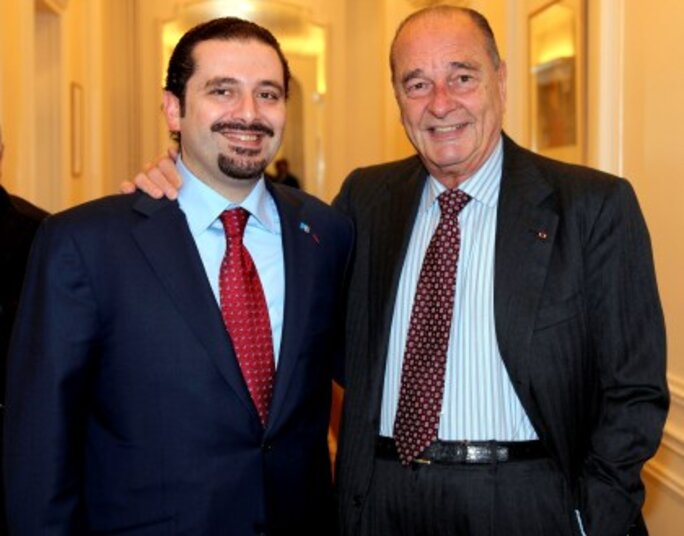
Contacted by Mediapart, representatives of Saad Hariri in France and in Lebanon did not reply to our request for an interview. Also contacted by Mediapart, the management of the company Fradim declined to be interviewed.
On April 3rd this year, outgoing president François Hollande awarded Saad Hariri the status of “commander” of the Légion d’honneur, the third highest rank of France’s most prestigious award of civil merit. “There is continuity”, Hollande said during the ceremony, referring to when Hariri was first granted the Légion d’honneur 11 years earlier by Jacques Chirac. “We hope you will continue to carry the torch of what you have represented since 2005,” added Hollande, in a reference to the political role taken up by Saad Hariri after his father’s murder that year, the French president apparently oblivious to the unravelling finances of the family business and the resulting consequences for its workforce of which he would have necessarily been informed.
The Hariri group is owner of the premises occupied by Oger International in the Paris suburb of Saint-Ouen, along with a number of other properties estimated to be worth a total of 100 million euros. Apart from the apartment on the Quai Voltaire, bought in 2001 for 4.4 million euros, Fradim owns a town mansion on the upmarket Place d’Iéna in central Paris, once used by Rafik Hariri for his stopovers in the French capital (and once the home of French engineer Gustave Eiffel), and which underwent refurbishment in 2014 costing 3.3 million euros. Fradim also owns a 204-square-metre apartment on the chic Left Bank street Rue Bonaparte, bought in 2006 for 2.3 million euros, and a 264-square-metre apartment on the Avenue Victor-Hugo in central Paris, bought in 2007 for 2.5 million euros. It also rents office buildings in the French capital.
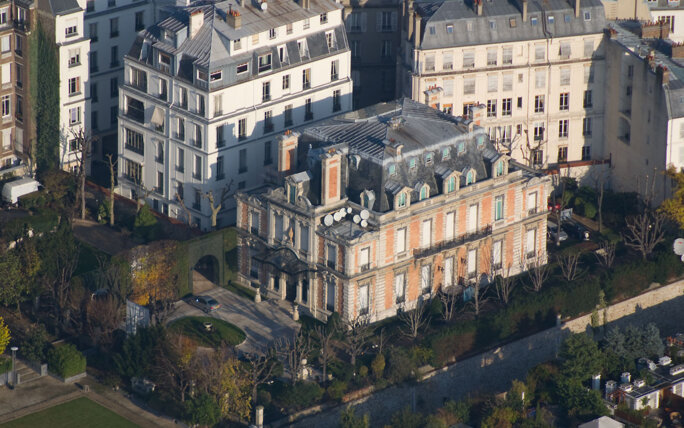
Enlargement : Illustration 5

Meanwhile, the name of French lawyer and Hariri business associate Basile Yared has been cited in the judicial investigation into suspected illegal political funding in connection with the sale of three French frigates to Saudi Arabia signed in 1994. The contract, codenamed Sawari II, was worth 19 billion French francs, the equivalent of almost 3 billion euros, of which 18% was to be paid in commissions to intermediaries. Strong evidence suggests that a part of the commissions were paid to intermediaries who were hired to funnel some of their payments back to France to be used as funds for then-prime minister Édouard Balladur’s presidential election bid in 1995 (see more here and here).
The magistrate in charge of the judicial investigation, Judge Renaud Van Ruymbeke, has established that sums equivalent to almost 40 million euros were paid, via the French office for weapons sales abroad, SOFRESA, to Lebanese Paris-based businessman and intermediary Ziad Takieddine, and also the subsequent transfer of some of the sums to Balladur’s political team.
Balladur was beaten in the 1995 presidential elections by his conservative rival Jacques Chirac, who is believed to have swiftly cancelled further payment of the staggered commission remunerations that could have continued to fund Balladur’s political ambitions.
Judge Van Ruymbeke has also found evidence that Rafik Hariri, via his family bank BankMed, paid Takieddine a total of 130 million dollars in three instalments – one of 75 million dollars on April 4th 1997, another of 25 million dollars on December 31st 1997 and another of 30 million dollars on May 31st 1998. The payments were allegedly made as compensation for Takieddine’s agreement to destroy the contracts related to the Sawary II sale. Takieddine has told the investigation that the sum was agreed during a meeting with Rafik Hariri at his Paris mansion house at the Place d’Iéna, when Basile Yared was given the task of managing the transaction and was personally involved in the destruction of the contracts.
According to Takieddine’s account, Rafik Hariri took over his position to receive remaining commission payments on the frigate deal, and that others in Chirac’s camp were also remunerated. The case is due to be brought to trial at an as yet unspecified date during 2018.
-------------------------
- The French version of this article can be found here.


